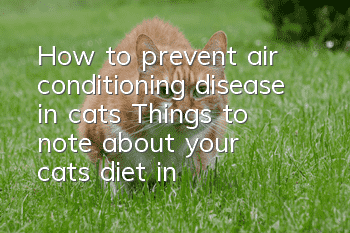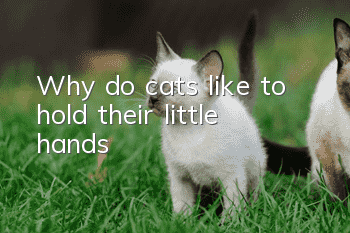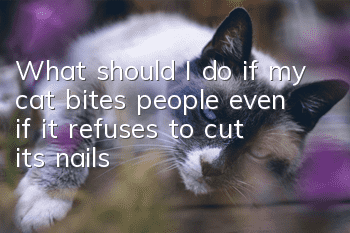How to prevent air conditioning disease in cats? Things to note about your cat’s diet in summer!

If a cat often stays in an air-conditioned room, it is easy for the cat to become depressed, sneeze, runny nose, cough due to poor air circulation, alternating hot and cold conditions, etc. In severe cases, the cat's body temperature will rise, and breathing and heart rate will accelerate. These symptoms are Air conditioning syndrome, also known as air conditioning disease. What methods can we use to prevent cats from suffering from air conditioning disease?
Common prevention methods for cats with air-conditioning disease
1. The cat should stay in an air-conditioned room, and the temperature should be controlled at 26 or 27 degrees Celsius. Do not blow the air-conditioned wind towards the cat. Generally, the air conditioner can be turned off after 1 to 3 hours, and then the windows can be opened for ventilation to ensure fresh indoor air circulation.
2. You can use a humidifier to prevent the air-conditioned room from being too dry and damaging the cat’s mucous membranes.
3. Make sure there is enough drinking water in the air-conditioned room so that the cat can replenish water and urinate more to expel toxins from the body.
4. Avoid taking the cat suddenly from the air-conditioned room to the outdoors, and give the cat an adaptation period. Before letting the cat go out, you can slightly raise the temperature in the air-conditioned room to give the cat a time to adapt, and then take the cat out after the cat's body temperature stabilizes.
Precautions for cats’ diet in summer
In summer, the climate is hot, the temperature is high, and the humidity is high. Bacteria breed quickly, and cat food is easy to spoil. There are a few things you should pay attention to when feeding cats in summer:
1. The food fed to cats must be fresh.
Whether it’s cooked food or canned food, when you put it in the cat bowl, the cat should eat it as much as possible. Never leave it for a period of time before feeding it to your cat, because it can be contaminated by bacteria in a short period of time in hot weather, and the cat will have a bad stomach.
2. Control the amount of cat food.
Hot weather makes people uncomfortable, and of course the cat’s appetite will also be affected. Therefore, do not force cats to eat in summer. It is best to eat small meals frequently and let cats eat in sections.
3. Throw away the food left by the cat.
The cat’s leftover food must be thrown away after each meal, and its food bowl must be cleaned to avoid the growth of bacteria. Don’t put the food bowl there for convenience and let the cat eat as he pleases, as this can easily ruin the cat’s stomach!
4. The cat’s food and water should be changed frequently.
Similarly, cats’ drinking water is prone to deterioration in summer, so it must be replaced frequently. In addition to preventing the drinking water from becoming stale, it can also prevent the breeding of mosquitoes. Mosquitoes are not only harmful to humans, but also to animals!
In addition, the amount of water cats drink will increase a lot in summer, so remember to add water to the cat's water bowl frequently. If possible, it is best to equip the cat with an automatic water dispenser.
- How to prevent cats from scratching walls. Train cats not to scratch walls.
- What should you pay attention to after urethrostomy surgery in male blue cats?
- What to do if a cat is anorexic? Most cats can regain their appetite after treatment
- One of the few things cat owners must pay attention to is whether I can spank a cat. Attention cat owners!
- Why doesn’t anyone keep Selkirk Rex cats?
- Why do short-legged cats have short legs?
- It takes a few days for a kitten to open its eyes and walk on its own
- What's going on with the black mud inside the cat's ears?
- How many days should it be safe to isolate a new cat from an old cat?
- Five common feline diseases



